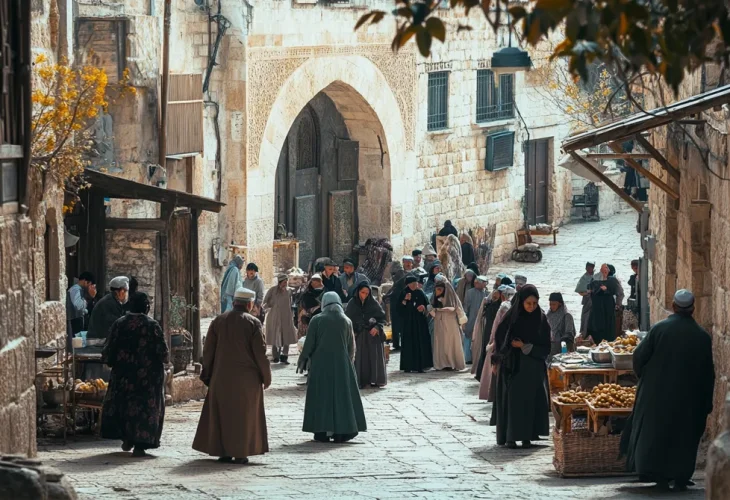History and Archaeology
The Untold Story of Jerusalem’s Bukharan Neighborhood
The incredible journey of Bukharan Jews from Muslim rule to Russian protection, and finally, to the heart of Jerusalem

We’ve all heard of the Bukharan neighborhood in Jerusalem, but where did it come from? And who were the Bukharan Jews?
First, a small correction. Bukhara isn’t a country, it’s a city in Uzbekistan. So technically, Bukharan Jews are Jews from Uzbekistan. But in truth, most Bukharan Jews actually came from a nearby city called Samarkand.
Samarkand is Uzbekistan’s third-largest city, and its history stretches back over 2,000 years. It was already thriving when Alexander the Great conquered it in 329 BCE. Later, it passed through Persian and Mongol hands, eventually becoming the capital of the Timurid Empire.
Jews lived in Samarkand since ancient times. They believed they were descendants of the Ten Lost Tribes, and modern DNA testing supports this tradition. About 200 years ago, a Jewish emissary from Spain encouraged them to adopt Sephardic customs, and most of the community did so.
Life under Muslim rule wasn’t easy. Jews had to follow laws that marked them as second-class citizens. But in 1865, everything changed. Muslim kingdoms in Central Asia rose up against Russian Czar Alexander II, who sent one of his top generals, Konstantin von Kaufman, to crush the rebellion. This general extended the Russian Empire’s borders all the way to Afghanistan, China, and Persia.
On May 1, 1868, General Kaufman entered Samarkand. After a short cannon attack, the Muslim leaders surrendered. The Russian army entered the fortress, believing the fight was over. But one Jewish leader, Moshe Kalantar, saw danger coming.
Known as “the President” of the Jewish community for his wisdom and leadership, Moshe Kalantar gathered a group of Jews led by a man known as “Chaim the Philosopher.” They helped the Russians fortify the city, digging trenches and planning defenses. The Russians were confused, hadn’t the Muslims already surrendered?
But on June 1, Kalantar warned that the Muslims were planning an attack. The Russians didn’t believe it. They couldn’t imagine the defeated locals would dare rise up again. Still, more and more Jews fled to the fortress, hoping for protection.
On June 2, Moshe Kalantar finally convinced the Russian officers that the danger was real. And it was. That day, 55,000 Muslim fighters laid siege to the fortress, where only 650 Russian soldiers and a few hundred Jews stood ready.
The Jews didn’t sit back. They fought alongside the Russians, helped prepare defenses, and provided food and water. Jewish women cared for the wounded and helped with logistics. Everyone knew that if the Muslims succeeded, the Jews would be the first to suffer.
Meanwhile, General Kaufman was busy fighting elsewhere and had no idea that Samarkand was under attack. For seven long days, the small group inside the fortress held out.
When the general finally returned and saw the siege, he acted quickly. His cannons wiped out thousands of rebels. Enraged by the betrayal, he ordered his soldiers to destroy the city and kill its residents.
At that terrible moment, Moshe Kalantar stepped forward once again. He begged the general to spare the Jews who had stood by the Russians. The general agreed, but there was one problem, how would the soldiers know who was Jewish?
Moshe Kalantar found a solution. He climbed onto a table, raised his tzitzit high above his head, and declared, “Like this, do not touch.” In this way, he showed the Russian soldiers what to look for, so they would protect anyone wearing tzitzit.
It worked. The massacre that followed spared the Jews. In gratitude, Czar Alexander gave Moshe Kalantar a special honor, and the Jewish community of Samarkand received new rights and protections.
But many Jews still longed to settle in the Holy Land. In 1884, Rabbi Shlomo Moussaieff and Rabbi Yosef Koghanov moved to Jerusalem and helped found the neighborhood that would later be known as the Bukharan Quarter.
The writer Ze’ev Yavetz described them: “Recently, many of our brothers from Bukhara have arrived, industrious in trade, wealthy, and engaged in finance. Among them are Torah scholars, noble and refined, some who love Hebrew and science.”
The neighborhood quickly became an economic and spiritual center in Jerusalem. It housed the famous Bukharan Market and many Jewish businesses. The Moussaieff Synagogue became a major hub for Torah learning, where great rabbis like Rabbi Ovadia Yosef gave their weekly classes.
Other Torah giants also lived in the area, including the great Kabbalist Rabbi Yitzchak Kaduri, the Ades family, and earlier, Rabbi Yaakov Chaim Sofer, author of Kaf HaChaim.
Today, most Bukharan Jews live in Israel. Only a small number remain in Samarkand, where one synagogue is still active. The descendants of Moshe Kalantar also made aliyah, and one of them even served in the early years of Israel’s Knesset.

